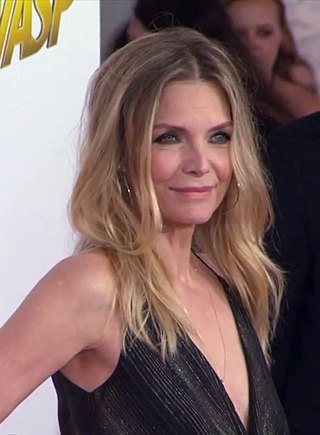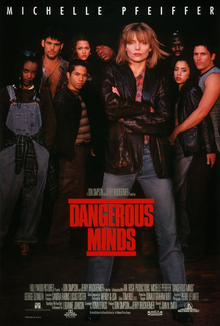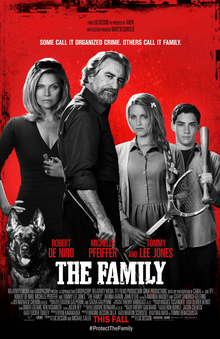Plot
On November 22, 1963, Dallas housewife Lurene Hallett (Michelle Pfeiffer) is obsessed with First Lady Jacqueline Kennedy. Lurene feels a special connection with Jackie, as both women have lost a child. Knowing that President John F. Kennedy and his wife will be visiting Dallas, Lurene travels to Love Field Airport to try to catch a glimpse of them as they arrive. Lurene just misses shaking Jackie’s hand.
Shortly afterward, she learns that the President has been assassinated. Lurene leaves her car in the street and rushes to watch the news through a store window. Grieving, she is determined to attend Kennedy's burial, even though her overbearing husband, Ray (Brian Kerwin), vetoes the plan.
Defiant, Lurene leaves him a note, indicating she will be staying at the motel where they spent their honeymoon in Washington, D.C., and catches a bus to the funeral. During the journey, she charismatically befriends Jonell (Stephanie McFadden), the young daughter of Paul Cater (Dennis Haysbert). After the bus has an accident, the trio await new transportation from a local police station. While Paul is questioned by authorities on his version of witnessing the accident, Lurene takes Jonell to the restroom where, while probing the child, she notices old wounds on Jonell's body. Upon hastily assuming that something is awry, Lurene asks Jonell whether Paul is her father, and the child breaks her silence to divulge that he isn’t. A panicked Lurene immediately calls the FBI to report a kidnapping, and attempts to shelter the child while awaiting the police to arrive.
Paul, having been thoroughly scrutinized by the local police thanks to Lurene's actions, explains that Jonell's wounds were sustained in the abusive Texas orphanage where she was taken after her mother’s death. He is indeed her father, and rescued Jonell, without permission, from the orphanage; Jonell does not remember him because he never married her mother. When he shows Jonell pictures of himself with her mother as well as Jonell as a baby, Lurene begins to believe his story. This does not resolve matters, however, and Paul must now elude the authorities until he can reach his home state of Pennsylvania, where his fight for custody will be met with less institutionalized racism.
With authorities on their way to the station, Paul and Jonell are required to evacuate the bus. While Lurene watches Jonell, Paul is forced to steal a car from a local repair shop to continue their journey. Lurene, through meddling, inadvertently misses the bus and inserts herself into the vehicle with the pair to embark on an increasingly difficult road trip across America. Meanwhile, due to Lurene's uninformed attempt at a tipoff, the FBI now believes that Lurene has been kidnapped by Paul; they inform Ray, who has been unaware of his wife's whereabouts, awaiting her return states away within their middle-class home.
The stolen vehicle breaks down near Tazewell, Virginia, where local rednecks spot the white woman travelling with a black man. While Lurene forages on foot for help, the clan return in her absence to beat Paul severely. Lurene recalls that the parents of Hazel Enright, a work associate, resides nearby, and seeks help there. They tend to Paul's wounds and spend the night there, with Paul and Lurene sharing a furtive one-night sexual encounter that satisfies her yearning for a fulfilled marriage and the affection of an attentive partner. The next morning, Mrs. Enright’s (Louise Latham) disapproval of Lurene’s extramarital interracial relationship reminds Lurene that she is complicating the journey. Having been offered the family's car, Lurene suggests Paul and Jonell proceed in her absence, but the three continue on together at Paul's request.
In Washington DC, on the day of the Kennedy funeral, Ray is waiting for Lurene at the motel she mentioned earlier. Lurene prefers to deal with Ray alone, leaving Paul and Jonell in the car. Ray argues with Lurene, and the argument turns violent with him striking her repeatedly. Paul intervenes, pretending to be the motel's manager. Despite Lurene's attempts to prove otherwise, Ray concludes that Lurene is allied with Paul and that they've had an affair. After Ray pulls a gun, Paul wrestles it from him. He and Lurene manage to get back to Jonell in the car and leave, but not before Ray notes the vehicle's description.
The police, having set up a road block, began investigating. A frantic Lurene jumps out, taking Jonell with her. Paul, the driver, is apprehended on the spot and sentenced to a year in jail for theft of the car that he stole from the repair shop. Meanwhile, Lurene and Jonell are caught while trying to escape and Lurene is apprehended, separating the trio.
Flashing forward to 1964 (as indicated by a Lyndon Johnson-Hubert Humphrey campaign poster), Lurene visits Jonell in a foster home. A regular occurrence, it is implied that Lurene has avoided serious legal repercussions for her part in the earlier events.
Lurene explains to Jonell that her father will be returning to take her home later that day. As Lurene leaves the group home, Paul arrives to pick up Jonell. Upon exiting his cab, the two stop to talk, and Lurene informs Paul that she and Ray are divorced. The two share a long embrace, and both declare that they have absolutely no regrets about the decisions that either have made. Lurene, in the Enrights' car, begins to drive away; however, she turns around and rushes back to join Paul and Jonell. [4]
Reception
Although the film was made in 1990, Orion Pictures suffered crippling financial losses and filed for bankruptcy. It was not released until December 1992, in time for Oscar consideration. [6]
Release
The film was released on December 11, 1992, and grossed $1,949,148 in the United States. [9]
Critical response
On Rotten Tomatoes, the film has an approval rating of 40% based on reviews from 10 critics, with an average rating of 5.7/10. [10]
Janet Maslin in The New York Times wrote: "This modest film actually covers a lot of ground... Love Field brings remarkably few preconceptions to the telling of its understated story. The characters transcend stereotypes, but what really matters is the actors' ability to breathe these people to life." [11] Time Out was similarly positive, writing: "This affecting romantic comedy probes the gradations of racial prejudice still prevalent in the South despite JFK's best efforts... unaccountably denied a theatrical release in Britain, this is a most impressive and enjoyable work." [12] On the negative side, Variety described it as "a sincere, not fully realized 1960s drama that is yet another variation on the 'Where were you when you heard JFK was shot?' theme." [13] Hal Hinson in The Washington Post thought that "the interracial love affair that develops between this oddly matched pair never makes much sense." [14] Roger Ebert in the Chicago Sun-Times wrote that "the essential truth of the characters was being undercut by all the manufactured gimmicks of the plot." [15]
Critical consensus held that the primary reason to see the film was the Oscar-nominated performance of Michelle Pfeiffer. The New York Times wrote that a "character this flamboyant would risk sinking any film. But Ms. Pfeiffer, again demonstrating that she is as subtle and surprising as she is beautiful, plays Lurene with remarkable grace." [11] The Washington Post called the characterization "a marvel, but by now that is only to be expected. Watching her [Pfeiffer] discover new facets of her talent is one of the real pleasures of going to the movies these days. Done up with a '60s platinum bouffant and butterfly fake eyelashes, Pfeiffer plays Lurene as a big-hearted, motor-mouth ditz. But, even in the movie's earliest scenes, Pfeiffer suggests that Lurene has hidden depth; not unrevealed smarts, really, but innate decency and guilelessness... She's fully alive up there on the screen: a grounded angel, tarnished, funny and exquisitely soulful, even when the movie is dead." [14] Desson Howe wrote: "there is strong reason to watch Love Field simply for Pfeiffer. As the nobly oppressed father (a sort of clichéd, Sidney Poitier role), Haysbert is respectable and doe-eyed McFadden makes a fetching innocent. But Pfeiffer is the movie's sole engine. Tucking away her gratuitous beauty behind pancake makeup and that blonde hay-er, she's in effortless, sassy command." [16] Peter Travers in Rolling Stone was of the opinion that "Pfeiffer overcomes the poky direction of Jonathan Kaplan ( The Accused ) and the unfocused script by Don Roos (of Single White Female infamy). She weaves magic in a portrayal of striking grace notes... long after Love Field hits a dead end, Pfeiffer cuts a path to the heart." [17] Time Out called it a "marvellously touching, funny and credible performance," [12] while for Variety it was "yet another memorable characterization." [13] Roger Ebert congratulated her for a performance "which takes a woman who could have become a comic target and invests her with a certain dignity." [15] Stephen Farber in Movieline wrote: "As Lurene Hallett, a dreamy beautician obsessed with Jackie Kennedy, Pfeiffer confirms her growing range and power. Her skill with accents is beginning to rival Meryl Streep's, but even more impressive than her technical virtuosity is her emotional depth; she highlights the childlike romanticism and generosity of this simple woman." [18]
















